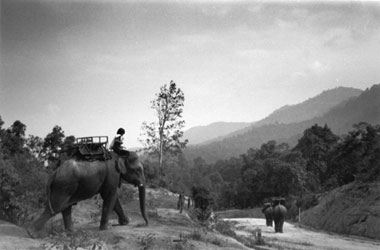SIAMESE SPIN
VARIETY MAY HAVE FOUND IT INEFFABLY STRANGE, BUT APICHATPONG WEERASETHAKUL’S MYSTERIOUS OBJECT AT NOON, SHOWN AT ROTTERDAM, IS A CINEMATIC TONIC FOR BORED EYES, A TRANSFIXING OBJECT OF WONDER THAT MERGES THAI FOLKLORE WITH SURREALIST TECHNIQUE. CHUCK STEPHENS REPORTS.
Ever since Nanook of the North’s Robert Flaherty used a cutaway igloo to turn all of Alaska into a giant soundstage, documentary filmmakers have been grappling with the ideas and ethics surrounding the imposition of narrative devices on the ostensibly organic and chaotic flow of "real life" events. But how many documentarians have focused on the act of constructing stories themselves? Mysterious Object at Noon, a weird, wonderful and altogether sui generis new documentary from Thailand, does just that, and in the process engages, unhinges and forever deranges the way that stories and cultural histories could – and perhaps should – be told.
The inspiration for Mysterious Object at Noon was the old Surrealist storytelling technique known as Exquisite Corpse, wherein a variety of writers would contribute to a story one sentence at a time, without knowing much about what the previous sentences contained. Director Apichatpong Weerasethakul – you can call him Joe – spent some time studying American experimental film at the School for the Art Institute of Chicago and wandered into a museum exhibition on Surrealism between classes. When he got back to Bangkok he decided he’d use the technique to structure a documentary, and he set out with a small crew, a 16mm camera and the goal of interviewing people throughout the country, learning a little bit about their lives and then asking them to contribute to the film’s evolving story.
What emerges is at once a portrait of Thailand’s disenfranchised lower classes – farmers, fruit vendors, village performers of "mor lam" (a song-and-storytelling hybrid extremely popular in the rural northeast) – and a fractured group-narration of a story about a handicapped boy and his tutor, a woman named Dogfar. One minute you’ll be watching some fly-on-the-wall coverage of a conversation, the next you’re inside a re-creation of a story fragment someone’s just contributed, and then just as suddenly you’re watching what appears to be a snippet of "real" Thai television – which seems to be commenting on the actions you've just seen. Infectious and willfully incoherent, Mysterious Object at Noon (which was co-financed by the International Film Festival Rotterdam’s Hubert Bals Fund) lives up to its title when a strange object rolls out of Dogfar’s apron and becomes, in the space of a cut, a kind of precocious homunculus of the handicapped kid we’ve only just begun to recognize.
"I’m interested in the possibilities of involving both fact and fiction in one film," says Joe via e-mail from Bangkok, "with each of them intersecting and supporting each other. I wasn’t thinking much about revolutionizing the narrative method, though. I even think my film is, in some ways, rather old-fashioned." The film’s Thai title translates as "Dogfar in the Devil’s Hand," a reference to the type of hyperbolic melodramas that have historically made up the bulk of Thai cinema, and throughout the film various popular and traditional Thai storytelling forms – songs, soap operas, theatrical clichés – intersect with Joe’s modernist designs. Any other influences? "Oh yeah," says Joe, "Duchamp and Andy Warhol."
Strange as all this may sound, stranger still is Joe’s position in Thai film culture, which remains, by and large, a politically straitjacketed and thoroughly commercialized monolith. "We’re the only independent production company in Thailand with zero budget," admits Joe of his 9/6 Cinema Factory, where he’s currently gearing up for his next feature, Driving. Joe also keeps himself busy as co-founder and programmer of the Bangkok Experimental Film Festival, and occasionally contributes articles to Bang!, a Thai- and English-language film periodical. "There is almost no knowledge of experimental film in Thailand, so producing the festival has been extremely rewarding. Last December one woman told us she’d cried during a screening of Bruce Baillie’s Quick Billy. That was completely energizing."
Those in search of a general overview of Thai film are encouraged to check out thaifilm.com, a site sponsored by the Thai Film Archive, and www.eurounderground.org, which has more information about the Bangkok Experimental Film Festival – the third installment of which is planned for December. Thailand may still be nominally considered part of the third world, but if it continues to produce filmmakers and activists as devoted as this, it may soon be taking a seat in the film world’s front row.
VOD CALENDAR


 See the VOD Calendar →
See the VOD Calendar →



